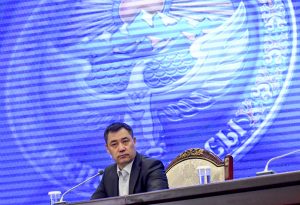Voters in Kyrgyzstan will head back to the polls, eventually.
The parliamentary elections conducted on October 4 were deemed by some Kyrgyz politicians to have been the dirtiest elections in the country’s nearly 30-year history. Of 16 parties that contested the election, only four cleared the 7 percent threshold to get into parliament. Of the four, two parties – Birimdik and Mekenim Kyrgyzstan – captured nearly 50 percent of the vote, an unprecedented and deeply suspicious victory.
Protests on October 5 brought down the government before the sun rose on October 6, when the election results were annulled. In a whirlwind month, Kyrgyzstan has seen protests, resignations, and a new government emerge.
The legitimacy of the new government formed by Prime Minister and Acting President Sadyr Japarov, who was in prison on election day, remains an open question, but Japarov’s government will have an opportunity to prove itself by confronting the problems that made the October 4 elections such a disaster.
It appeared Japarov’s government was prepared to try. On October 21 the Central Election Commission (CEC) named December 20 as the date for repeat parliamentary elections, but the next day parliament canceled the CEC decision. Voting was put off possibly until the start of June, though Japarov later said parliamentary elections would happen before March. Another decision parliament made on October 22 was that constitutional reforms should be implemented by January 10, 2021. Then, on October 24, police raided the CEC office and carried away documents; somehow that same day the CEC announced a presidential election was scheduled for January 10, 2021.
Japarov, as acting president, is technically ineligible to run for president, but he announced on October 26 that he would step down as acting president and prime minister at the start of December to run for president “as an ordinary citizen.” The legality of that move is still being debated. Meanwhile, the CEC as of October 26 was saying it will fight the decision to move parliamentary elections from December 20.
If he expects to be elected president Japarov will have to work to form alliances with at least some of the opposition groups that took part in the elections and were the major force in bringing down the government. He’ll also need to implement measures to show the international community he can be a responsible and reliable leader.

































